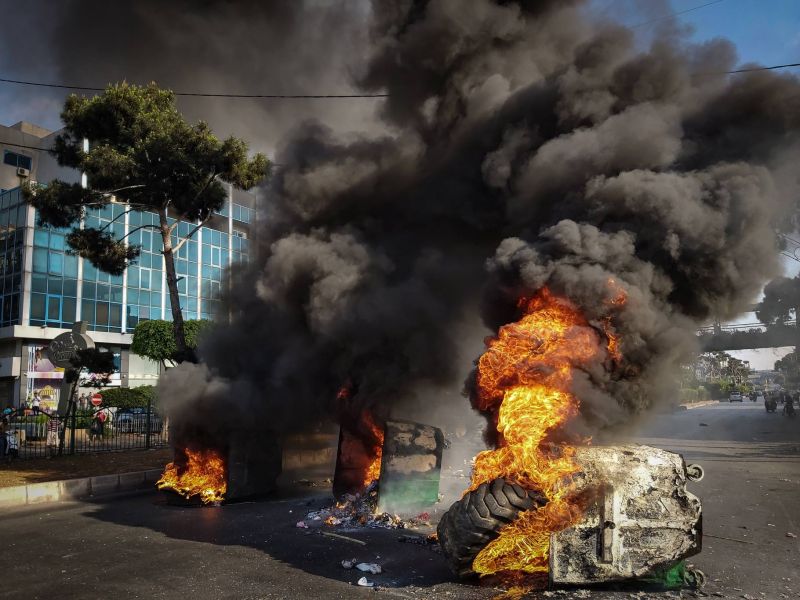
Protesters set dumpsters alight on the airport road on Thursday evening. (Credit: João Sousa/L’Orient Today)
Want to get the Morning Brief by email? Click here to sign up.
As traffic continues to snarl roads outside gas stations, senior officials met yesterday to discuss solutions to the ongoing fuel crisis. President Michel Aoun, caretaker Energy Minister Raymond Ghajar, caretaker Finance Minister Ghazi Wazni and Banque du Liban Gov. Riad Salameh met at the Presidential Palace in Baabda to discuss “exceptional measures” that the central bank could take to alleviate gas shortages. Since October 2019, BDL has been providing fuel importers with US dollars at the official exchange rate of LL1,507.5 to cover 90 percent of the cost of imports. However, importers say that the bank has recently been failing to honor their invoices, meaning they cannot pay foreign suppliers, which in turn leads to shortages in the market. According to L’Orient-Le Jour’s Baabda correspondent, one of the proposals discussed was providing dollars to importers at a rate of LL3,900, which would almost certainly cause prices at the pump to surge.
Protesters returned to the streets on Thursday as the lira hit another record low and the fate of fuel subsidies hung in the balance. The lira was trading at LL16,000 to the US dollar when the market closed. Protesters stopped traffic up and down the coast with burning tires and overturned dumpsters and held sit-ins outside Banque du Liban’s headquarters.
The private hospitals’ syndicate warned that fuel and medical supply shortages may force hospitals to close. Hospitals, like homes and other businesses across the country, use fuel to power backup generators during state electricity cuts, but this fuel is becoming ever scarcer and pricier. The syndicate also warned that rising operating costs due to the lira’s collapse would force many hospitals to increase their fees, putting pressure on already stretched insurers such as the National Social Security Fund. Adding to these concerns, the syndicate said it was informed that beleaguered hospital employees may soon be unable to access their salaries in cash lira due to new restrictions imposed by commercial banks.
Lebanese depositors, who are already locked out of a large portion of their dollar and lira savings, may soon struggle to access even their salary in cash. At least two commercial banks have begun asking employers to deposit workers’ salaries in cash lira in order for the employees to be able to withdraw the money in cash. The move comes after the central bank tightened restrictions on the amount of lira it is giving to commercial banks, leaving them short on cash. Although the policy purportedly focuses on industries with a high volume of cash transactions, businesses that deal extensively in checks and credit, including private hospitals, also said they have received the banks’ recent request.
A joint parliamentary committee approved a draft law that would create a ration card system for Lebanon’s most vulnerable families, replacing the current subsidy scheme for basic goods. In the draft’s most recent iteration, more than 500,000 people would receive up to $137 a month, according to Deputy Parliament Speaker Elie Ferzli. Details about how residents could access the dollars and at what rate were not provided. During the session, Alexander Mouradian, one of the central bank’s vice governors, said that if the card would require funding from its mandatory foreign currency reserves, BDL would require “official authorization” from the state, L’Orient-Le Jour reported.
Hezbollah Secretary-General Hassan Nasrallah will deliver a televised address at 5:30 p.m. today. He is expected to discuss the latest political developments, including the hamstrung cabinet formation process. During a speech over the weekend, Free Patriotic Movement leader Gebran Bassil called on Nasrallah to intervene to break the ongoing government formation deadlock between Prime Minister-designate Saad Hariri and President Michel Aoun, who is also Bassil’s father-in-law. Lebanon has been without a fully functional cabinet for more than 10 months.
A “Pfizer marathon” will take place across Lebanon today and tomorrow for residents aged 50 and older who want to receive the COVID-19 vaccine, the Health Ministry announced. With only 9 percent of the population partially vaccinated and only 8.7 percent fully vaccinated, the country’s slow vaccine rollout has pushed the Health Ministry to organize more vaccine marathons to immunize as much as possible of its 75 percent of the population target by mid-July.